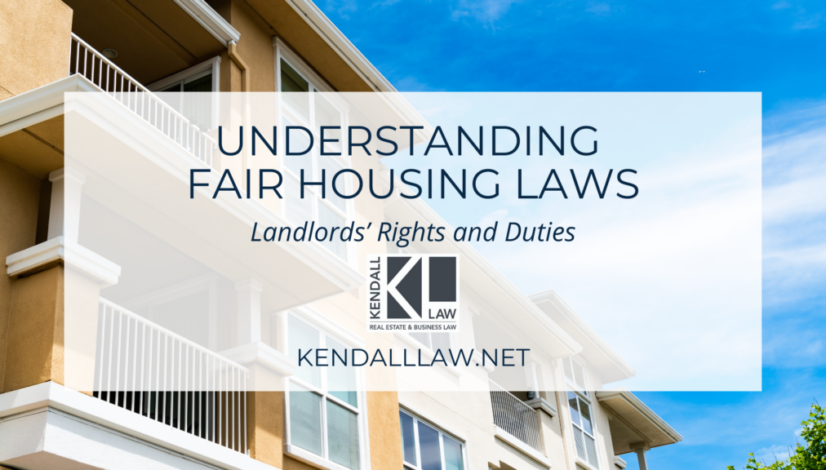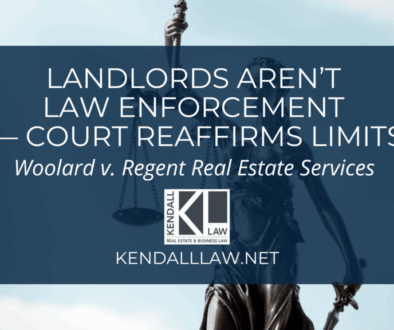Understanding Fair Housing: Landlords’ Rights and Duties
Fair Housing is a generic term used to refer to the various federal, state and local laws that prohibit discrimination in housing decisions based on membership in a protected class. While it may be difficult for landlords to know all of the intricacies of the Fair Housing laws, it is critical that they do understand the key points in order to avoid some of the common issues and mistakes that can arise oftentimes without intent.
First, it is important to understand the main principles that come from the laws i.e., landlords cannot make a decision in any aspects of housing (renting, sales, evictions, terms/conditions, mortgages, and insurance) based on things like:
- Race (including traits historically associated with a race, like hair texture and protective hairstyles like braids, locks or twists)
- Color
- National origin
- Religion (including religious dress and grooming practices)
- Sex (which includes pregnancy, childbirth, breast feeding, or medical conditions related to those things)
- Sexual Orientation
- Gender, gender identity, and gender expression
- Familial/Marital status
- Ancestry
- Source of Income
- Disability
- Veteran or military status
- Genetic information
A landlord cannot make inquiries about immigration or citizenship or require any statement or certification concerning immigration or citizenship status. Further, a landlord cannot disclose information about immigration or citizenship with the intent to harass or intimidate that person, nor influence someone to vacate a property by threatening to disclose their immigration or citizenship status. However, information necessary to determine or to verify an applicant’s financial qualifications and identity can be requested. In this case, asking for a government-issued photo identification is acceptable.
Types of Discrimination
Even if there was no intent to discriminate, actions can be discriminatory. There are two general types of discrimination to be aware of.
Disparate treatment is where a person is treated differently because of their membership in a protected class.
Discriminatory effect is where a facially neutral policy (appears neutral on its face) has an effect on protected classes even if the effect was not intended. The most common example of this is overly restrictive occupancy standards. While it may appear neutral on its face, this could have a discriminatory effect.
To demonstrate that the landlord is working to follow Fair Housing laws, policies against discriminatory management practices on the property should be established. Should a policy be deemed discriminatory, landlords will need to prove that there is legally sufficient justification for the policy and:
- The policy or practice is necessary to achieve one or more substantial, legitimate, and nondiscriminatory business interests;
- The practice effectively carries out that interest; and
- There is no feasible alternative practice that would equally or better accomplish the identified business interest.
An example could be a rental property owner implementing a policy requiring all tenants to have a minimum credit score to qualify for a lease. If challenged as potentially discriminatory, the landlord would need to demonstrate that the policy serves a substantial and legitimate business interest, such as ensuring financial stability and reducing the risk of rent defaults. They would need to show that the policy effectively achieves this interest by establishing a correlation between credit scores and responsible tenancy. Additionally, they would need to prove that there is no feasible alternative practice available that would equally or better accomplish the identified business interest, such as a different screening criteria that could provide the same level of risk assessment. By meeting these criteria, the landlord may defend the policy as being justified and nondiscriminatory.
Fair Housing & Advertisement
Fair Housing laws also encompass how a landlord or housing provider can advertise rental property. Advertisements should NOT:
- State any discriminatory preference or limitation on account of race, color, national origin. Advertising should NOT use words that describe current or potential residents or the neighbors or neighborhood in racial or ethnic terms.
- State any explicit preference, limitation or discrimination as to religion. For instance, if the name of the entity or property contains a religious name or symbol, that can be perceived as a preference for that religion. Advertisements must have a disclaimer that there is no discrimination on the basis of religion, color, race, etc. (Please work with your real estate attorney to help with this.)
- State any preference, limitation, or discrimination, based on sex.
- State any exclusions, limitations, or other indications of discrimination based on handicap, i.e., no wheelchairs.
- State any preference, limitation, or discrimination based on familial status such as number and ages of children nor state preference for adults only.
The most common error made in advertising rental property is stating preferences based on source of income. Oftentimes, there may be a statement indicating that Section 8 or other rent assistance will not be accepted and that proof of employment is required. However, this could be considered a violation of the Fair Housing laws and landlords should understand that verifiable income can be substantiated by a variety of sources when accepting tenants for rental properties.
Limits to the Number of People Per Unit
This is a highly debatable issue as there are no set rules or regulations to restrict a landlord’s ability to limit the number of occupants in a rental. However, a policy that is too restrictive may violate Fair Housing laws against families or people of certain ethnic or national origin (as multi-generational households are common in many cultures).
The Department of Fair Employment and Housing has used the rule of two persons per bedroom plus one as an enforcement guideline. But this is not a hard and fast rule to rely upon as larger units may accommodate more people and will likely be subject to a different standard. Landlords should work with their real estate attorneys and look at local housing rules to see what standards apply to their property and the types of housing units they provide.
Reasonable Accommodations Versus Modification
Fair Housing laws also require housing providers to make reasonable accommodations to permit persons with disabilities to use and enjoy a dwelling. From a legal standpoint, landlords should understand the difference between accommodation and modification related to their rental property.
A reasonable accommodation is a change, exception or adjustment to a rule, practice or service that may be necessary for a person with a disability to have an equal opportunity to use and enjoy a dwelling.
A reasonable modification is a structural change made to an existing premises that is occupied or is to be occupied by a person with disability.
There are two threshold questions to ask that need to be answered when a modification or accommodation is requested:
- Is the requestor a person with a disability?
- Is there a disability-related need for the requested accommodation or modification?
The biggest error often made by landlords is asking for or demanding information about the disability. This is not allowed. A landlord can request verification of the disability if it is not apparent, but the landlord is not entitled to information about the nature or extent of the disability.
Verification of the disability can be provided by any verifiable third party that is in a position to know about the individual’s disability. This can be a family member that cares for the person, a support group or non-medical service agency.
While this can be sensitive to navigate, a modification can be denied in limited circumstances IF the landlord can prove that there is an undue financial burden to make the modification, that the modification would result in a fundamental alteration to the services or operations of the rental property, and/or the modification poses a direct threat to the health and safety of others. Landlords should consult with their real estate attorney before denying requests to ensure they’re not inadvertently violating Fair Housing laws.
Service/Emotional Support Animals
There are also differences between service animals and emotional support animals (ESAs). Service animals are animals that are trained to perform specific tasks to assist individuals with disabilities. ESAs provide emotional, cognitive or other similar support to an individual with a disability.
For a service animal, the only things that can be asked are:
- Are you an individual with a disability?
- What is the disability-related task that the animal has been trained to perform? (They cannot be asked to have the animal do the task the animal is trained to do. )
ESAs are not entitled to the same rights and privileges as service animals, and businesses are not required to accommodate them under the Americans with Disabilities Act. However, California’s disability discrimination laws may allow for ESAs as a reasonable accommodation in certain circumstances.
For an ESA, the tenant must provide verifiable documentation from a medical professional that has a relationship with the tenant at least 30 days prior to providing the documentation, indicating that they have a disability and the tenant has a disability-related need for the ESA.
Landlords can set reasonable rules for the residents to follow. However, tenants cannot be charged fees for having service animals or ESAs including charging a higher security deposit or additional liability insurance. Furthermore, a no pet rule does not apply when it concerns service animals and ESAs as they are not pets. A dog cannot be required to be leashed if unable to perform its duties while on a leash. Service animals and ESAs cannot be restricted to only certain areas as they need to be able to accompany the owner anywhere on the property.
Parameters for service animals and ESA are not a general rule and should be specific to the situation based on the needs of the tenant and the role the animal serves.
Reach Out For Help
Navigating Fair Housing laws and landlords’ rights and duties can be tricky as landlords may not even realize that they could be violating the laws. Working with a qualified real estate attorney who specializes in this area can provide invaluable guidance and protection. At a minimum, landlords should have a skilled real estate attorney check the local laws that apply to the type of rental property and its particular jurisdiction. It is also advisable that housing providers partner with an attorney who understands the intricacies of Fair Housing regulations and can review rental agreements and operational services and practices to ensure compliance.
Contact the team at Kendall Law today or call 310-619-4941 for a consultation about your rental property practices to mitigate risks, and safeguard your business investment.
Please note that the information provided at this website is intended for general educational and informational purposes only, and should not be construed as legal advice or a substitute for legal advice from a qualified attorney in your jurisdiction.




